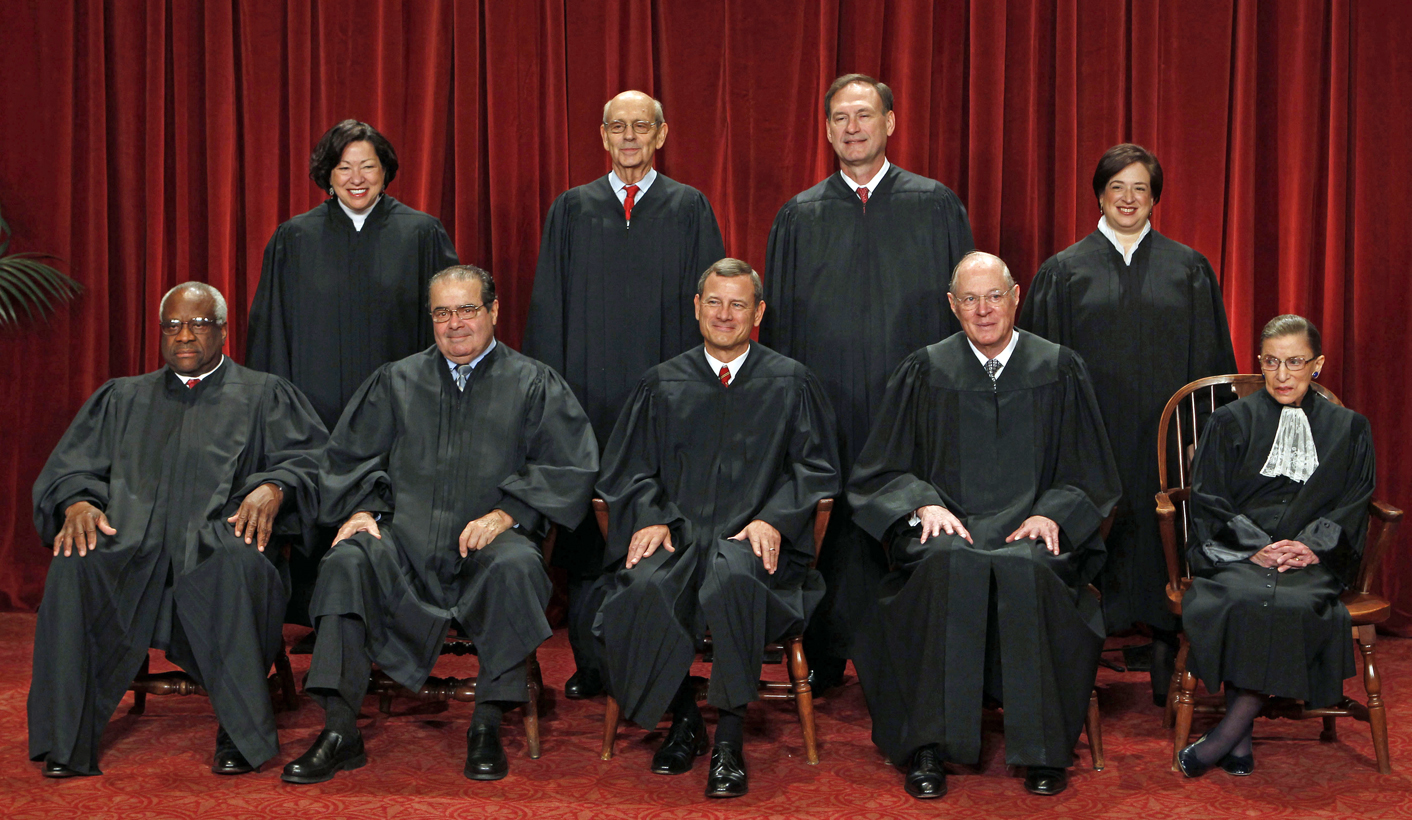Mid-morning on Thursday, the US Supreme Court issued a monumental ruling that went straight to the heart of questions over the healthcare reforms passed by Congress in 2010. The court ruled that the stipulated penalties for failing to participate in mandatory health insurance could not be based on the commerce clause of the Constitution, the one that gives Congress the right to regulate interstate commerce. This is what the Obama administration had actually argued – ineffectually in the view of many legal commentators - based on some admittedly obscure precedents like a congressional mandate on the members of the US militia back in the early 19th century to buy their own muskets, bullets and black powder.
But, and this turned out to be the key point of the ruling, the court’s opinion stated the Affordable Care Act (and most of its many, complex details) clearly was constitutional under the explicit stated power of Congress to establish taxes on citizens. As a result, the US government couldn’t force everyone to buy insurance. The mandate (or tax) penalty was constitutional if they didn’t buy insurance. With that decided, so too virtually all of the rest of the law.
This subtle distinction at first actually caught some commentators off balance as the decision was being read out. TV news reporters reporting from in front of the Supreme Court’s building, and getting quick bullet points from inside the court’s chamber on the court’s view on “mandates”, initially reported the court had ruled the crucial part of the law was unconstitutional. They then had to do an abrupt volte face, live on TV, when the other shoe dropped from the next lines of Chief Justice Roberts’ reading of the majority opinion.
Unlike a media-obsessed White House and Congress, the Supreme Court hews to a much earlier style of decision-making and relationship with the press. It allows no TV cameras into the chamber and seats are limited to a few hundred intrepid early risers who, this time certainly, were lined up at sunrise to be able to gain entry to hear the historic ruling first hand.
This unanticipated majority opinion by five justices (there were four dissenters) included the four more liberal justices who were expected to support the law, but the five also included the court’s putatively conservative-leaning chief justice, John Roberts. Roberts sided with the court's four liberal justices - Stephen Breyer, Ruth Bader Ginsburg, Elena Kagan and Sonia Sotomayor - to form the 5-4 majority.
In reading the majority opinion, Roberts even quoted that famous aphorism from “Founding Father” Benjamin Franklin, who had been in on both the writing of the Declaration of Independence and the Constitution, that nothing was as certain in life as death and taxes. This shout out to the Constitution’s writers and their original intent (a standard rallying cry for conservatives) was clearly aimed at giving a deeper historical context to this court ruling in clinching the point that the right to tax was the key to the whole argument.
The ruling did put some limits on the law's planned expansion of the Medicaid insurance programme for the poor, a programme that is a joint effort of the federal government and states. The decision said the US government cannot threaten to withhold a state's entire Medicaid allotment if it doesn't participate in the expansion.
This ruling will have still-to-be-fully-understood implications on the now-unfolding presidential race – but it is already under close examination by every politician, political analyst, pollster, journalist, seer, soothsayer, hospital administrator and tax accountant in America. One thing is clear already, however. In the initial evaluations, this ruling serves as a massive boost for the Obama administration as it “girds up its loins” for the remaining months of the re-election campaign. Imagine by contrast how it would already be spun if the court had ruled otherwise - and visualise the funereal atmosphere, the renting of garments and the donning of sack cloth and ashes that would be the required attire at Obama’s Chicago campaign headquarters.
One particular irony of the day’s decision was lost on few observers - certainly not by incredulous Republican politicians. As a senator, Obama had voted against confirmation of John Roberts as chief justice when George W Bush had appointed him. Regardless, Roberts proved to be the deciding vote in favour of Obama’s core presidential achievement.
Over time, this one may even prove to be much worse for conservative politicians than when their expectations were quashed back in the Eisenhower administration. Ike had appointed California governor Earl Warren as chief justice with the expectation Warren would prove to be a restrained, almost quiescent jurist – rather than the activist leader of the so-called Warren court he became. That court ushered in the civil rights revolution with key decisions that began with the Brown vs Board of Education ruling that outlawed school segregation.
Speaking immediately after the import of the ruling was becoming clearer, former Democratic Senate Majority Leader Tom Daschle, a key proponent and advocate for this measure when he was in the Senate, told the media he was overjoyed. Daschle said now we “can implement, can go forward with full speed,” even though “the politics will continue to play out and (there will be) all kinds of ads” against the law.
Within an hour of the court’s decision, Republican presidential candidate Mitt Romney was at his Washington DC campaign offices, speaking to reporters and television cameras of his continuing opposition to the law - and now the court’s ruling. Romney promised that, if elected, he would push to repeal that healthcare law and he repeated some of his now familiar – and not entirely true – charges that this law represents a major new federal intrusion into the details of an individual’s healthcare, it imposes cuts on Medicare (the government’s health care plan for the elderly), and rips up the ordinary citizens’ connections to their family physician – if they could afford one. Romney then tried to minimise the effect of this ruling for his campaign, arguing the court’s decision only said the law was constitutional, not that it was good law or right for the nation.
Not surprisingly, Obama then spoke to White House reporters just a few minutes later. He applauded the decision and then described the main features of the law and how they will – over the next several years – come to ensure broader, less expensive coverage of healthcare insurance to most citizens, prevent insurance companies from imposing lifetime cost limits on coverage or refusing to accept new people to be insured because of pre-existing conditions. From Obama’s corner it was a win, all around.
With this ruling, a key dynamic of the presidential race has abruptly changed - the distinction between the two candidates is now crisply drawn, voters will now reach their conclusions about which candidate is in their corner. It also flushes Romney out into the open to come up with a cogent – detailed - explanation of how he could possibly sponsor a measure in Massachusetts while he was governor that was remarkably similar to “Obamacare”, even as he totally opposes this federal equivalent now. Undoubtedly, too, Democrats will be chivvying him everywhere to explain – also in detail – what he would replace Obamacare with, should he actually end up in the White House.
On the other hand, the Obama campaign now has to embrace acknowledging that this mandated penalty for those who refuse to sign up for health insurance (to cover the costs of supporting offsets for their healthcare costs downstream) is actually a tax – and one that will probably end up being levied more against middle class families than anybody else. In this, Obama’s problem is that this is precisely what he had said he would not support when he first ran for the presidency. We’ll start to hear a great deal about “foolish consistency” and the “hobgoblins of small minds” from commentators on this, no doubt.
Nonetheless, watch for the Obama campaign to use this new judicial lease of life to heighten its strategy of appealing to niche groups of voters and winning them away from Republican temptations. As the various provisions of the Affordable Care Act begin to take effect or come closer to doing so, Obama is going to be able to point to all those low-income families who no longer have “to sell the farm” to pay for grandma’s surgery, to young people up to age 26 who can now remain under their parents’ healthcare coverage, to people with difficult medical conditions who will no longer be denied healthcare insurance, and to people who will never find that their coverage stops just as their health care costs start to soar with a difficult-to-treat disease or condition.
Also, watch for an army of Obama surrogates who will begin chanting something very much like “Where’s your plan Mitt, where’s the plan?” every time Romney attacks Obamacare – and there will be echoes of this call even during the face-to-face presidential and vice presidential debates. Hey, there’s going to be something to write about during this election campaign after all! DM
Read more:
- A look at the ruling upholding Obamacare at the AP (this report specifies the precise parts of the act and how they are implemented)
- Supreme Court upholds health-care law, individual mandate at the Washington Post
- Supreme Court Allows Health Care Law Largely to Stand at the New York Times
- Supreme Court to deliver Obama healthcare law ruling at Reuters
- Obama health law faces Supreme Court judgment at the BBC
- Awaiting Ruling on Fairly Simple Questions About a Complex Health Law at the New York Times
- John Roberts’ Moment: The Chief Justice Weighs Image and Principle in Obamacare Decision at Time
- Awaiting Ruling on Fairly Simple Questions About a Complex Health Law at the New York Times
- Waiting for Robbo - Even if the Supreme Court strikes down Obamacare, there could be a silver lining for the president (an earlier analysis in the Economist)
- Justice Scalia must resign, a column by EJ Dionne chastising Justice Scalia for his comments during an earlier court ruling
- D-Day, a column by Linda Greenhouse, the New York Times’ veteran legal reporter
- Mitt Romney on Health Care (at his campaign website)
- The US Supreme Court website
- National Federation of Independent Business v. Sebelius (the actual opinion from the Supreme Court)
Photo: The justices of the U.S. Supreme Court gather for a group portrait in the East Conference Room at the Supreme Court Building in Washington, October 8, 2010. Seated from left to right in front row are: Associate Justice Clarence Thomas, Associate Justice Antonin Scalia, Chief Justice John G. Roberts, Associate Justice Anthony M. Kennedy, Associate Justice Ruth Bader Ginsburg. Standing from left to right in back row are: Associate Justice Sonia Sotomayor, Associate Justice Stephen Breyer, Associate Justice Samuel Alito Jr., and Associate Justice Elena Kagan. REUTERS/Larry Downing





